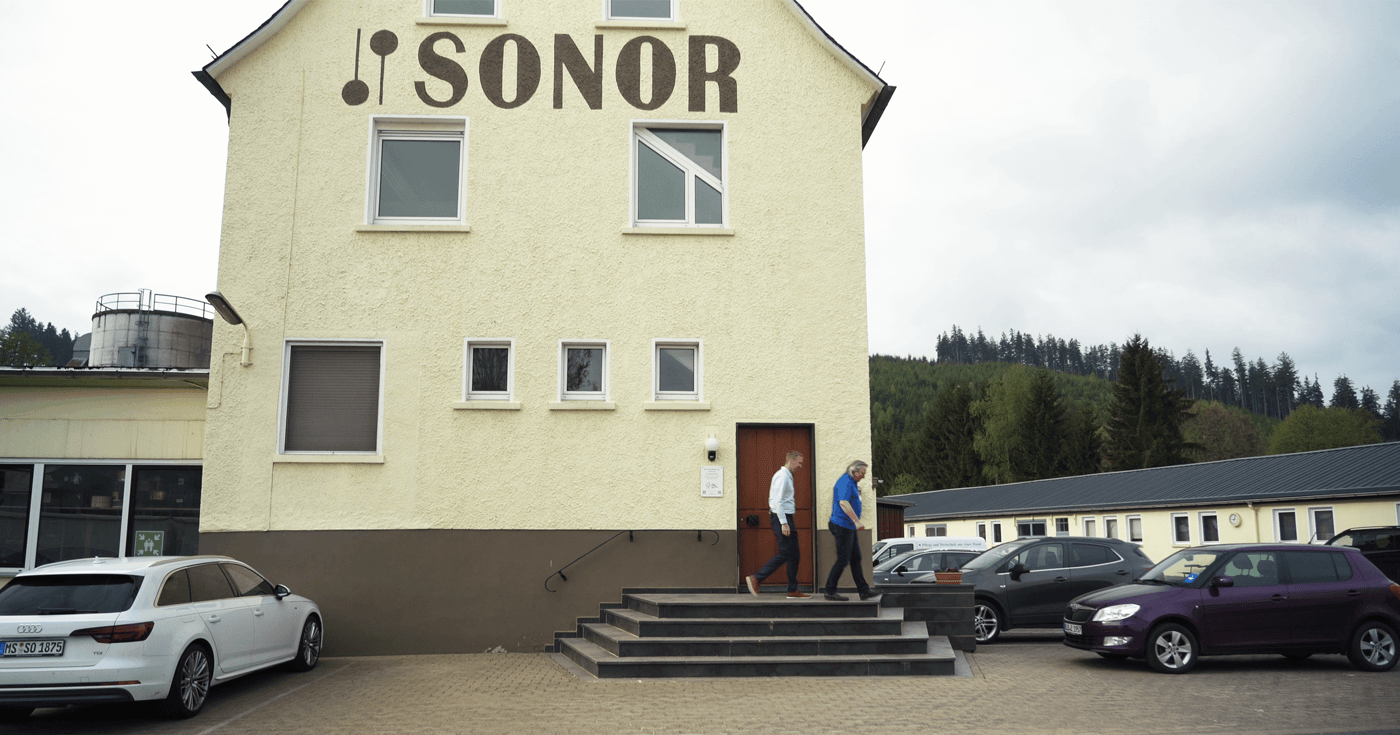
Germany is a beautiful country with a rich history, strong culture, and amazing beer. It’s also home to the world’s oldest drum manufacturer: Sonor Drums.
When we decided to launch a documentary series covering the stories and craftsmanship behind our favorite instruments, starting with Sonor was a no-brainer.
The factory is based in Bad Burleburg, a few hours north of Frankfurt. But that wasn’t always the case. A man named Johannes Link founded the company in 1875 in Weissenfels, East Germany. His son Otto eventually took over, followed by his grandson, Horst.
After World War II, the family had to flee East Germany’s new communist regime, leaving behind their homes, their drum-making machinery, and everything else they had. They joined relatives in Bad Burleburg. Otto Link was on the Council of Sweden, and a personal friend to King Gustav, which afforded the family some financial assistance and support from the Swedish Royals. They re-established the company on new ground, and everything took off from there.
When we arrived at the factory, I met with brand manager Karl Heinz-Menzel, who told me about the company history and brand values. “If you want to be successful,” he said, “especially in the music or drumming industry, you need to have passion. Combined with the history of this company, it means something very special.”
Karl gave us the grand tour, and let me tell you, we didn’t want to leave. Sonor produces everything from world-class drums, hardware and accessories, all the way to cajones and glockenspiels. In the documentary, you’ll see me take an SQ2 set out for a session in the beautiful countryside, but I also sat down with some Prolite, SQ1, and AQ2 Series kits.
During the trip we also met master craftsman Horst Treude, who has been building drums at Sonor since 1980. He knows the ins and outs of the production line from start to finish. It took him 7 or 8 years to get comfortable with all the details, but now he’s one of the master makers who can turn thin sheets of wood into beautifully finished drums.
As if a tour wasn’t exciting enough, I had the chance to build a Sonor Vintage Beechwood snare drum (with some help, of course). This 14” drum is designed to have a classic ‘60s sound, which comes largely from the rounded bearing edge that replicates the drums of that era.
Here’s how they do it at Sonor:
First, they ‘cook’ the wood in an oven so it contains zero humidity when it goes into production. Their beechwood is local, their birch comes from Scandinavia and Finland, and their maple comes from Canada. They also carry exotic veneers like African marble, rosewood, amboyna, and more. On top of all these woods, Sonor has a huge range of wraps, from shiny or striped to patterned or pearl.
To assemble and finish the drums, the factory holds over 19,000 different parts. With shelves upon shelves of organized containers, walking through this section is like being in a hardware store!
The finished shell will be nine plies thick. We started with three beechwood plates, each of which contains three wooden plies. For this drum, the outer, center, and inner plates all need to be different lengths. One of Sonor’s craftsmen cut the plates to the right size before sending them for pressing.
After a quality check for thickness and surface consistency, we carefully applied the glue to bond the plies together. We layered these inside the pressing machine, where we applied heat and pressure to fuse everything together. Each drum needs at least 10 minutes of pressing time.
The shell was cut down to the correct depth before a careful sanding process ensured the drum was perfectly flat on both sides. The drum was treated to a round bearing edge before it was tested for flatness again. If the shell is off even by the thickness of one piece of paper, it needs to be fixed.
Sonor’s sanding and polishing process depends on the finish and shell. It only takes one round of sanding for a wrap finish. But for high gloss painted shells, it takes seven sanding and polishing stages – done by hand – before sealing and lacquering. Because our snare drum was getting a wrap, we only had to sand it once.
For drums needing the high gloss treatment, those shells get an anti-static cleaning so they don’t attract dust during lacquering. There are at least 5 hand lacquering steps before the shell goes on a rotating drying rack for around 45 minutes. Then, they go through another round of sanding and polishing.
But in our case, Sonor ran our vintage pearl wrap and drum through a machine, applying glue to either side. After five minutes of drying, they put the wrap and drum through the machine together.
A machine calculated the position of each cut, then drilled the holes and created the snare bed. Then I added hardware, like screws, lugs, the vent hole, badge, snare strainer, and rims. After applying the production stamp to the inside of the drum, it was ready to ship back home!
A few features set Sonor drums apart from others on the market. One of these is the smaller shell sizes. Another is the construction, which comes from Sonor’s old timpani designs: the drumhead goes far beyond the bearing edges, which creates a different sound.
Quality definitely comes first for these guys. Karl emphasized that they don’t want to create price-driven products. They make everything the way they should be made, whatever the cost. “If you want to have the best, you really think about it twice.”
If you love drums, it’s worth taking the time to appreciate the tools and people behind your favorite gear. Thanks, Sonor Drums, for the experience of a lifetime!
*This article contains affiliate links, which means we might earn a small commission from the product seller if you make a purchase. For more info, check out our privacy page.


By signing up you’ll also receive our ongoing free lessons and special offers. Don’t worry, we value your privacy and you can unsubscribe at any time.
We use cookies for traffic data and advertising. Cookie Policy »